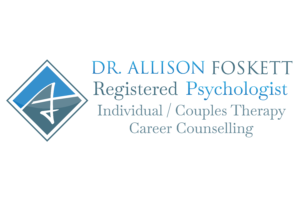Counselling for Anxiety and Stress
As a registered psychologist located in South Edmonton, Alberta, I provide counselling and therapy for both anxiety and stress. So, what is anxiety?
What is Anxiety?
Anxiety might involve a persistent feeling of nervousness and anticipation about something negative and catastrophic happening in the near or distant future.
We might feel immobilized and paralyzed by our anxiety. Anxiety is often present even when a specific stressor or situation is not currently happening, or perhaps the stressor is in the past and is no longer happening.
Anxiety is different than stress.
Stress is an internal reaction to an external event or trigger. Feeling stressed involves how we appraise, perceive and then respond to these events. The stress usually alleviates itself once the event or external cause is over.
In the case of anxiety however, we continue to feel a sense of unease and worry about the future even when a specific stressor or situation is not actually happening.
Everyone experiences some anxiety, however, once it becomes chronic we can experience a decline in our own mental health and well-being, and notice decreased functioning at work, school, and in our relationships with others.
With chronic anxiety we can become “fear-based” and our world can feel like it’s shrinking. In other words, we live and make decisions out of fear. Fear however, is different than anxiety and stress.
Fear is actually defined as an emotional response when there is immediate danger or threat, or we perceive something dangerous is about to happen.
Anxiety, on the other hand, involves emotional reactions to hypothetical events we imagine could happen, and of course, there is always a possibility that they could happen.
Receiving psychological therapy to treat your stress and anxiety can be an important step to help prevent you from developing an actual anxiety disorder or to prevent it from getting worse.
How Common is Anxiety?
Anxiety is a very common reason that folks seek out therapy by a registered psychologist.
Did you know that the average annual prevalence for anxiety disorders within Canadian adults is estimated to be 4.6% for employed adults and 8% for unemployed adults (based on Statistics Canada data between 2000 and 2016)?
Symptoms of Anxiety
Are your anxiety symptoms interfering with your overall well-being? Do you feel paralyzed or held back by your anxiety and excessive worry? Do you struggle with any of the following symptoms?
- Nervousness or feeling on edge
- Inability to relax or let go
- Feeling as if you are in “over-drive”
- Fear or excessive worry
- Irritation
- Inability to concentrate or focus
- Sleep difficulties (unable to fall asleep, stay asleep, or having a restless sleep)
- Muscle tension
- Feeling overwhelmed, exhausted, or burnt out
- Increased heart rate
- Feeling at the “end of your rope” or an inability to cope with regular life demands
These are just a few of the symptoms of anxiety and stress.
Panic and Fear
Some individuals may also experience bouts of panic, or, panic attacks which involve a much more intense fear or discomfort. Symptoms of a panic attack might include but are not limited to the following:
- Fear of losing control, dying, or going crazy
- Feeling a sense of dread or impending doom
- Pounding heart or discomfort in the chest
- Difficulty breathing or having a shortness of breath
- Noticing your body or limbs trembling or shaking
- Feeling dizzy or faint
- Nausea
- Feeling disconnected from reality or feeling detached from yourself
A key experience in many anxiety disorders is avoidance. This avoidance decreases anxiety in the short-term but actually increases it in the longer term.
This video produced by Therapist Aid provides a great explanation of the cycle of anxiety:
I love the simple explanation of the cycle of anxiety. If you are curious about your own symptoms that seem to present as anxiety, try the following screening tool.
Free Online Screening Tool for Anxiety
https://screening.mhanational.org/screening-tools/anxiety/
This is not a formal diagnostic tool but simply a screening tool to begin to understand if you might potentially have some symptoms of anxiety. Keep in mind that many symptoms of anxiety overlap with other psychological concerns.
Contributing Factors to Anxiety
There are many different contributing factors to anxiety. Research based on twin studies suggests that the heritability of anxiety might range between 30-50%.
Environmental influences such as stressful life events, trauma, learned behaviours and habits, poor social supports and connections, change and transition might be other contributing factors.
In addition, some psychological factors might include the inability to cope with stress, unhelpful thinking patterns and beliefs, hopelessness, and susceptibility to negative affect.
Treatments Available for Anxiety
There are many different psychological treatments for anxiety. As a registered psychologist located on the south side of Edmonton, Alberta, a key approach that I integrate into my practice and treatment of both anxiety and depression is Cognitive Behavioural Therapy (CBT).
This is an evidence-based and highly effective treatment based on over 2000 clinical studies. It has been shown to be helpful for many psychological disorders including anxiety, trauma, depression, bipolar disorder, and more.
CBT for Anxiety Treatment: What is involved
- Generally focuses on the present (while still addressing issues from your past as needed)
- Works with your patterns of thinking and helps “re-wire” your brain and thinking styles to help you achieve better mental health, wellness and performance in your life
- Identify and name your anxiety triggers
- Is goal-oriented and strives for making behavioural changes
- Involves problem-solving situations in your life
- Emphasizes your strengths and ways in which you are progressing over time
- Provides psycho-education so you can leave therapy by gaining practical skills
- Offers you concrete strategies and techniques that help you change the way your brain works, and lead to changes in how you feel and behave.
Sessions are collaboratively adapted to your own unique needs rather than being a manualized approach.
How Frequent are Sessions?
You are in control of the frequency of your sessions. I recommend that you attend sessions weekly for the first few weeks as we strengthen our therapeutic relationship and begin with some key interventions to help reduce any acute anxiety symptoms.
Some folks might stay with weekly sessions or space their sessions out every two or three weeks once they have started to gain some relief.
You get to decide what works best for you based on your time and budget.
The video published by the Beck Institute for Cognitive Behavioural Therapy provide a good overview:
Together we’ll explore what is causing your anxiety, and I’ll ensure that you learn new skills to effectively treat your condition.
Just like building a new muscle, treating your anxiety takes practice, experimentation, and some time, however it’s well worth the investment to restore a sense of peace, relaxation and well-being.
You may receive psychoeducation on:
- Theories of stress, arousal, and anxiety
- Basics of neurobiology of anxiety within your brain and nervous system
- Psychological, social, and biological functions of anxiety
- Evidence-based “top down” and “bottom up” approaches to managing your stress and anxiety, and increasing relaxation
- Strategies and specific protocols to break out of autopilot responses to anxiety using step by step approaches
Other Treatments for Anxiety
I may also integrate other approaches into my treatment of anxiety including:
- Acceptance and Commitment Therapy (ACT)
- Eye-Movement Desensitization Reprocessing (EMDR) Therapy
- Emotion-Focused Therapy
- Person-Centred Therapy
- Mindfulness and somatic approaches.
Managing Stress and Staying Resilient
A person doesn’t need to feel highly stressed or anxious in order to improve their well-being. People also attend counselling to become more resilient.
The Psychological Association of Alberta (PAA) has published an excellent video on stress and resilience:
Interested in seeking help to become more resilient and less anxious?
I am a registered psychologist located on the south side of Edmonton, Alberta. You can email me at: allison@diamondcareercounselling.com or you may call me at 780-803-1825. I also provide free 15-minute phone consultations.


